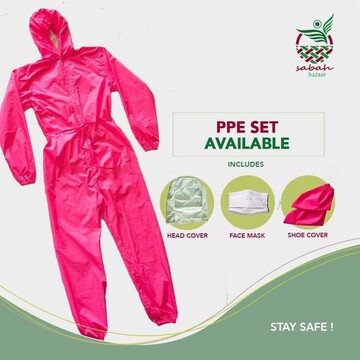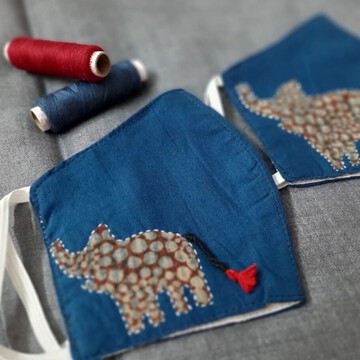Work Shift: How Women-Led Enterprises Are Producing PPE To Fight The Pandemic And The Economic Slowdown
The spread of COVID-19 across South Asia has resulted in the large-scale shutdown of business operations. While almost all industries have been adversely affected, the garment industry is one of the worst-hit. This has left export houses and domestic manufacturers without work orders and with no guarantee of future work. However, with the onset of the disease, the demand for Personal Protective Equipment (PPE) for frontline workers has seen an increase. And many garment manufacturers have looked to capitalise on this opportunity.
Alongside a cut-throat garment industry, South Asia – in the recent decades – has also witnessed the emergence of women-led collectives and social enterprises that operate within this sector. While these collectives too have felt the unwelcome effects of market disruptions, they have realigned their supply chains to produce PPE and provide women workers with income opportunities.

In Production
Within HNSA’s membership, SABAH Nepal, SABAH Bhutan, and SADHNA (India), Ruaab (India) are all currently engaged in PPE production. We share an overview:
SABAH Bhutan
Organising Model: Social enterprise
Product type: Face masks and coverall samples
Current Production Volume: Over 200,000
Buyer/s: Bhutan’s Ministry of Health who will distribute the masks to health workers
HBWs Involved: 150 women
Buy/Contact: https://www.facebook.com/pg/SABAH-Bhutan-345514608843568/about/?ref=page_internal
SABAH Nepal
Organising Model: Social enterprise
Product Type: Face masks, head covers, coveralls, and lining for hospital beds
Current Production Volume: More than 10,000 face masks and 2000 coveralls
Buyer/s: Hospitals, local government/municipality offices, retail supplier
HBWs Involved: 100 women
Buy/Contact: https://www.facebook.com/shopatsabah/photos/a.647566918993151/1077499192666586/?type=3&theater
Ruaab SEWA (India)
Organising Model: Social enterprise
Product Type: Cotton face masks
Current Production Volume: 350,000 face masks
Buyer/s: Garment retail firms
HBWs Involved: 150 women from New Delhi and the Indian states of Punjab, Bihar and West Bengal.
Buy/Contact: https://www.instagram.com/p/CAhkQYlhmtq/
Sadhna (India)
Organising Model: Social enterprise
Product Type: Face masks (woven and non-woven), coveralls, caps and hoods, and shoe covers
Current Production Volume: 100,000 face masks alongside regular production of Sadhna’s textile products.
Buyer/s: NGOs, private schools, local government agencies (for distribution to health workers), private hospitals
HBWs Involved: 100 women
Buy/Contact: https://store.sadhna.org/fabric-face-mask.html

While only a limited number of home-based workers are currently engaged in PPE production owing to restricted mobility and because organisations are still investing in the necessary production equipment, enterprises are hopeful that their orders will only increase and that they will be able to provide work to larger groups. One positive sign is that HBWs who are currently engaged in PPE production have not reported a loss in income. HBW members of Ruaab, SABAH Bhutan and Sadhna have reported earnings comparable to previous incomes. And SABAH Nepal says that workers are now earning more than they used to with the shift to PPE production.
These earnings are going beyond just keeping these HBWs and their families from falling into grave poverty as Ms. Seema Shah, CEO - Sadhna, explains, “While we did provide basic rations to many of our members, we are constantly wary of our members becoming dependent beneficiaries, losing their status as empowered breadwinners – something that they have worked for so many years to achieve. Therefore, our efforts are focused on bringing back dignified livelihood to all our members.” Further, Ms. Kezang Dorji, Production Manager and Officiating Executive Director - SABAH Bhutan adds, “We are hearing of increased instances of domestic violence during this lockdown. In many cases this is aided by frustration caused due to the men losing their jobs, and also not having access to the traditional outdoor recreational activities due to the lockdown. As the women are bringing in money, their status in the home improves.”

The Role of the Enterprise
HBW enterprises go beyond merely accessing work. With the COVID-19 crisis, they have, at an early stage, identified the opportunity in PPE production. And have also allocated resources towards procuring orders from Governments and private vendors, designing, and marketing while also ensuring that the products meet quality specifications.
At this juncture, the previous investments made by collectives in skill trainings are also paying off. Skilled home-based workers have been quick to readjust to the new demands and produce products that they have not previously made.
Given the shutdown of traditional markets and restriction of movements, HBW enterprises have also turned their focus onto virtual platforms to market their products. Ruaab, for example, has revamped its Instagram presence and is marketing its products on the platform while, both, SABAH Nepal and Sadhna are looking to bring in business through website sales.

Essential Work
COVID-19 has completely changed the dynamics of the working world and ‘work-from-home’ is being touted as the future. This critical conversation around the future of work and its significance is bound to be incomplete without recognising HBWs – in the informal sector – whose work in the past few months has ensured that countries do not fall short of essential PPE in their fight against COVID-19. Going forward, countries will have to recognise that home-based work as work and that home-based workers are essential not just to sustain economies but to also support societies in moments of crisis.
At this point, recognition of these workers will need to entail support to HBW collective so that they can further invest in skills and infrastructure. Government support initiatives could include access to subsidised loans, working capital, and subsidies on payments towards social security benefits. Further, unemployment benefits to support workers in such times, is also crucial, to protect the workers and keep them afloat. Better data collection and maintenance of statistics of informal workers will go a long way in enabling this and ensuring that these essential workers receive their due.
Lead Image Courtesy: Tashi Namgay Kidney
Other Images Courtesy: SABAH Nepal, Ruaab, Sadhna, and The Bhutanese

